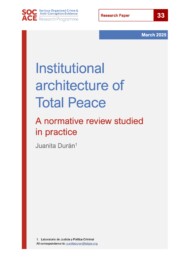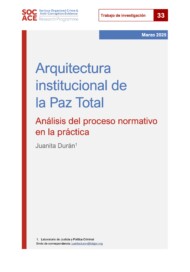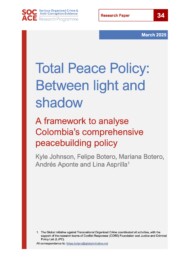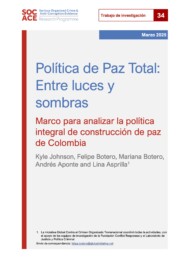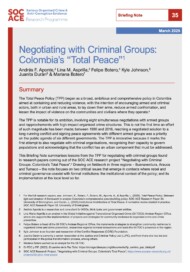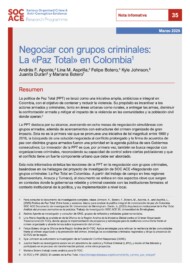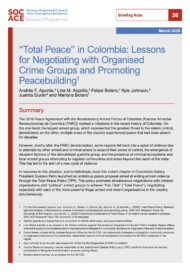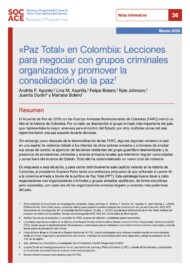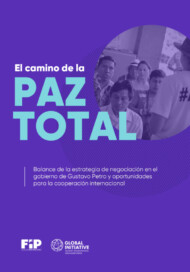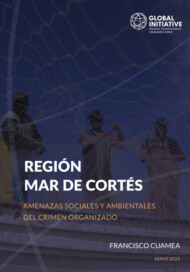The implementation of the Total Peace policy (TPP) in Colombia faces regulatory, institutional, and territorial challenges that limit its effectiveness. These reports reveal that the lack of an integrated regulatory framework weakens negotiation processes, while in some regions, the framework for dialogues, among other factors, is deepening criminal governance. Local governance structures remain largely excluded from the decision-making process, reducing the policy’s impact at the local level.
These conclusions come from research conducted by experts from the Global Initiative Against Transnational Organized Crime (GI-TOC), the Conflict Responses Foundation (CORE), and the Criminal Justice and Policy Lab (LJPC), with the technical and financial support of the Serious Organized Crime and Anti-Corruption Evidence (SOC ACE) research program at the University of Birmingham. The reports provide an in-depth analysis of the Total Peace policy’s legal foundation and its effects on security and governance across key conflict regions in Colombia.
The first report, “Institutional Architecture of Total Peace: A Normative Review Studied in Practice”, by Juanita Durán, examines how the lack of an integrated legal framework is impeding the government’s ability to reach sustainable agreements. It highlights gaps in judicial transition mechanisms that make peace negotiations difficult to finalize.
The second report, “Total Peace Policy: Between Light and Shadow”, by Kyle Johnson, Felipe Botero, Mariana Botero, Andrés Aponte, and Lina Asprilla, investigates the course of negotiations with armed groups in Buenaventura, Arauca and Tumaco in the framework of the implementation of the policy. In some cases, the negotiations are favoring the consolidation of power by criminal organizations.
The Briefing Note Negotiating with Criminal Groups: Colombia’s “Total Peace” summarises lessons from the TPP for negotiating with criminal groups found in research papers. Drawing on fieldwork in Buenaventura, Arauca and Tumaco the note focuses on two critical issues that emerge in contexts where rebel and criminal governance coexist with formal institutions: the institutional context of the policy; and its implementation at the local level so far.
The Briefing Note Total Peace” in Colombia: Lessons for Negotiating with Organised Crime Groups and Promoting Peacebuilding provides important lessons on the need to understand the evolving nature of violence; the importance of coordinating between local and national authorities; appropriation of the concept of “hybrid political orders”; and the importance of timing and sequencing in negotiations.
The research papers, with their respective briefing notes, intends to spark discussions on the obstacles to implementing Total Peace and offers recommendations to strengthen negotiation strategies and improve local governance integration.
Paz Total en Colombia: arquitectura institucional y desafíos para su implementación
La implementación de la política de Paz Total en Colombia enfrenta retos normativos, institucionales y territoriales que limitan su efectividad. Esto reportes de investigación revelan que la ausencia de un marco normativo integral debilita los procesos de negociación, mientras que en algunas regiones el marco de los diálogos, entre otros factores, está profundizando su gobernanza criminal. Las estructuras de gobernanza local permanecen, en gran medida, excluidas del proceso de toma de decisiones, lo que reduce el impacto de la política a nivel local.
Estas conclusiones provienen de las investigaciones realizadas por expertos de la Iniciativa Global contra el Crimen Organizado Transnacional (GI-TOC), la Fundación Conflict Responses (CORE) y el Laboratorio de Justicia y Política Criminal (LJPC), con el apoyo técnico y financiero del programa de investigación de pruebas anticorrupción y delitos organizados graves (SOC ACE) de la Universidad de Birmingham. Los informes ofrecen un análisis detallado sobre la base legal de la Paz Total y sus efectos en la seguridad y gobernanza en las regiones de Buenaventura, Tumaco y Arauca en Colombia.
El primer informe, “Arquitectura institucional de la Paz Total: Análisis del proceso normativo en la práctica”, elaborado por Juanita Durán, examina cómo la falta de un marco legal integrado está obstaculizando la capacidad del gobierno para alcanzar acuerdos sostenibles. El documento resalta vacíos en los mecanismos de transición judicial que dificultan la finalización de las negociaciones de paz.
El segundo informe, “Política de Paz Total: Entre luces y sombras”, escrito por Kyle Johnson, Felipe Botero, Mariana Botero, Andrés Aponte y Lina Asprilla, investiga la trayectoria en las negociaciones de los grupos armados en Buenaventura, Arauca y Tumaco en el marco de implementación de la política. En algunos casos, las negociaciones están favoreciendo que las organizaciones criminales consoliden su poder.
La nota informativa Negociar con grupos criminales: la “Paz Total” de Colombia resume las lecciones extraídas del Programa de Paz Total (TPP) para negociar con grupos criminales, basándose en investigaciones académicas. A partir de trabajo de campo en Buenaventura, Arauca y Tumaco, la nota se centra en dos cuestiones críticas que surgen en contextos donde la gobernanza rebelde y criminal coexiste con las instituciones formales: el contexto institucional de la política y su implementación a nivel local hasta la fecha.
La nota informativa “Paz Total” en Colombia: Lecciones para negociar con grupos del crimen organizado y promover la construcción de paz proporciona enseñanzas clave sobre la necesidad de comprender la naturaleza cambiante de la violencia, la importancia de la coordinación entre autoridades locales y nacionales, la apropiación del concepto de “órdenes políticos híbridos” y la relevancia del tiempo y la secuencia en las negociaciones.
Los informes de investigación, con sus respectivas notas informativas, buscan fomenta una discusión acerca de los retos para implementar la Paz Total y ofrecer recomendaciones para fortalecer las estrategias de negociación e integrar mejor la gobernanza local.
